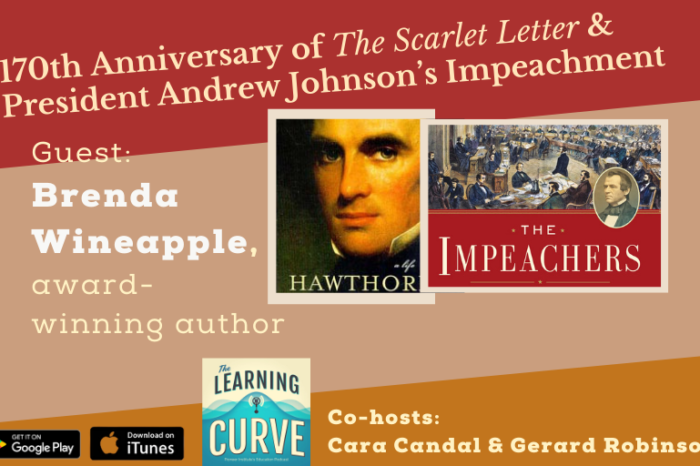Award-Winning Writer Brenda Wineapple on the 170th Anniv. of The Scarlet Letter & Pres. Andrew Johnson’s Impeachment
This week on “The Learning Curve,” Cara and Gerard are joined by Brenda Wineapple, author of the award-winning Hawthorne: A Life and The Impeachers: The Trial of Andrew Johnson and the Dream of a Just Nation. They discuss her definitive biography of Nathaniel Hawthorne and the 170th anniversary of the publication of his classic novel, The Scarlet Letter. They explore how Hawthorne’s writing was shaped by the author’s Salem, Massachusetts setting and his notorious Puritan ancestor, who had been involved in the Witchcraft Trials. Brenda describes why Hester Prynne, the protagonist of The Scarlet Letter, is such a compelling heroine, and why students today should read Hawthorne’s work. The discussion then turns to Brenda’s most recent book, The Impeachers, and the impulse to condemn or publicly shame. President Andrew Johnson’s impeachment trial was the first against any U.S. chief executive. Brenda talks about how it influenced Americans’ view of their chief executives, accountability, and whether we are likely to see increased attempts to remove presidents from office. The episode concludes with Brenda doing a reading from The Impeachers.
Stories of the Week: In New Hampshire, the state Supreme Court is hearing a case challenging the adequacy of the state’s school funding formula, contending that local taxpayers are being unfairly required to cover a disproportionate amount of school budgets. In South Carolina, the pandemic has led to a substantial increase in enrollment in virtual charter schools.
Guest:
 Brenda Wineapple is the author most recently of The Impeachers: The Trial of Andrew Johnson and the Dream of a Just Nation. Called “superbly lyrical” and “a landmark study,” it was selected by New York Times critic Jennifer Szalai as one of the 10 best books of 2019 and named one of the New York Times “100 Notable Books of 2019.” Wineapple is also the author of Ecstatic Nation: Confidence, Crisis, and Compromise, 1848-1877, one of the New York Times “100 Notable Books of 2013,” which the Wall Street Journal hailed as “magnificent.” Among her other publications are White Heat: The Friendship of Emily Dickinson and Thomas Wentworth Higginson, a finalist for the National Book Critics Circle award; Hawthorne: A Life; Sister Brother: Gertrude and Leo Stein, and Whitman Speaks, an edition of the poet’s pithy observations about writing, literature, and America. The recipient of a Literature Award from the American Academy of Arts and Letters, a Guggenheim Fellowship, a Pushcart Prize, an American Council of Learned Societies Fellowship, and two National Endowment Fellowships in the Humanities, Wineapple recently received an NEH Public Scholars Award for The Impeachers. She regularly contributes to major publications such as the New York Times Book Review and The New York Review of Books and teaches in the MFA programs at Columbia and the New School.
Brenda Wineapple is the author most recently of The Impeachers: The Trial of Andrew Johnson and the Dream of a Just Nation. Called “superbly lyrical” and “a landmark study,” it was selected by New York Times critic Jennifer Szalai as one of the 10 best books of 2019 and named one of the New York Times “100 Notable Books of 2019.” Wineapple is also the author of Ecstatic Nation: Confidence, Crisis, and Compromise, 1848-1877, one of the New York Times “100 Notable Books of 2013,” which the Wall Street Journal hailed as “magnificent.” Among her other publications are White Heat: The Friendship of Emily Dickinson and Thomas Wentworth Higginson, a finalist for the National Book Critics Circle award; Hawthorne: A Life; Sister Brother: Gertrude and Leo Stein, and Whitman Speaks, an edition of the poet’s pithy observations about writing, literature, and America. The recipient of a Literature Award from the American Academy of Arts and Letters, a Guggenheim Fellowship, a Pushcart Prize, an American Council of Learned Societies Fellowship, and two National Endowment Fellowships in the Humanities, Wineapple recently received an NEH Public Scholars Award for The Impeachers. She regularly contributes to major publications such as the New York Times Book Review and The New York Review of Books and teaches in the MFA programs at Columbia and the New School.
The next episode will air on Wednesday, October 7th, 2020 at 12 pm ET with Paul Peterson, the Henry Lee Shattuck Professor of Government and Director of the Program on Education Policy and Governance at Harvard University.
Tweet of the Week
Fellow Kathleen Hall Jamieson of @APPCPenn on how Americans Learn More About Civics the Hard Way via @WSJ: https://t.co/iUHVl4I0Ca
— The AAPSS (@TheAAPSS) September 28, 2020
Newslinks:
School Funding Debate Back in New Hampshire Supreme Court
https://www.nhpr.org/post/school-funding-debate-back-new-hampshire-supreme-court#stream/0
SC charter school enrollment surges as COVID-19 awakens parents to education options
https://www.thestate.com/news/local/education/article246000790.html
Get Updates on Our Education Research
Related Content



























